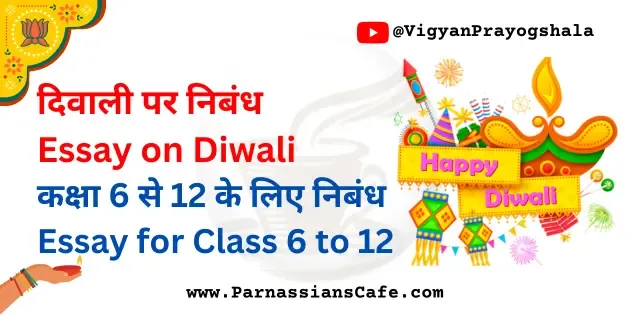दिवाली पर निबंध (Essay on Diwali in Hindi) | Bilingual essay for class 6th to 12th
- परिचय
- दिवाली के पीछे का इतिहास
- दिवाली में लक्ष्मी की पूजा क्यों की जाती है?
- दिवाली कैसे मनाई जाती है?
- दिवाली का महत्व
- दिवाली पर पटाखे फोड़ते समय क्या सावधानियां बरतनी चाहिए?
- निष्कर्ष
परिचय:
दिवाली, जिसे दीपावली के नाम से भी जाना जाता है, भारत में सबसे महत्वपूर्ण और व्यापक रूप से मनाए जाने वाले त्योहारों में से एक है। यह रोशनी का त्योहार है जो बुराई पर अच्छाई और अंधकार पर प्रकाश की जीत का प्रतीक है। यह त्योहार सभी उम्र, धर्मों और समुदायों के लोगों द्वारा बड़े उत्साह और आनंद के साथ मनाया जाता है।दिवाली के पीछे का इतिहास:
दिवाली के पीछे का इतिहास प्राचीन भारत से जुड़ा हुआ है। हिंदू पौराणिक कथाओं के अनुसार, दीवाली उस दिन को चिन्हित करती है जब भगवान राम राक्षस राजा रावण को हराकर अयोध्या लौटे थे। अयोध्या के लोगों ने भगवान राम का मार्ग रोशन करने के लिए दीये और मोमबत्तियां जलाकर उनका स्वागत किया।दिवाली से जुड़ी एक और किंवदंती (लोगों द्वारा प्रचलित कथा) यह है कि यह राक्षस नरकासुर पर भगवान कृष्ण की जीत का जश्न मनाती है। इस कथा के अनुसार, मथुरा के लोगों ने राक्षस पर भगवान कृष्ण की जीत के उपलक्ष्य में दिवाली मनाई।
दिवाली में लक्ष्मी की पूजा क्यों की जाती है?
लक्ष्मी धन और समृद्धि की देवी हैं, और दिवाली के दौरान उनकी पूजा की जाती है। लोगों का मानना है कि दिवाली पर देवी लक्ष्मी की पूजा करने से उनके घरों में सौभाग्य और समृद्धि आती है। लोग अपने घरों को साफ करते हैं और उन्हें देवी लक्ष्मी के स्वागत के लिए फूल, रंगोली और रोशनी से सजाते हैं।दिवाली कैसे मनाते हैं?
दिवाली का जश्न आमतौर पर पांच दिनों तक चलता है, जो धनतेरस से शुरू होकर भाई दूज तक चलता है। इन पांच दिनों में लोग अपने घरों की सफाई करते हैं, नए कपड़े खरीदते हैं, अपने घरों को रोशनी और रंगोली से सजाते हैं और स्वादिष्ट भोजन और मिठाई बनाते हैं।दिवाली के दिन लोग दीया, मोमबत्ती और पटाखे जलाकर अंधकार पर प्रकाश की जीत का जश्न मनाते हैं। लोग अपने दोस्तों और रिश्तेदारों से भी मिलते हैं, उपहारों का आदान-प्रदान करते हैं और मिठाई बांटते हैं।
दिवाली का महत्त्व:
दिवाली भारत में एक महत्वपूर्ण त्योहार है जो लोगों को एक साथ लाता है और खुशी और सकारात्मकता फैलाता है। यह बुराई पर अच्छाई की जीत का प्रतीक है और हमें हमेशा धार्मिकता का मार्ग चुनने की याद दिलाता है। दिवाली विभिन्न धर्मों और समुदायों के लोगों के बीच एकता और भाईचारे को भी बढ़ावा देती है।दिवाली पर पटाखे फोड़ते समय क्या सावधानी बरतनी चाहिए:
दिवाली पर पटाखे फोड़ते समय सुरक्षा सुनिश्चित करने के लिए कुछ सावधानियां बरतनी जरूरी है। पटाखे फोड़ते समय बच्चों पर हमेशा निगरानी रखनी चाहिए और उन्हें सिखाया जाना चाहिए कि पटाखे हाथ में न पकड़ें और न इधर उधर फेंकें। पटाखों को इमारतों और पेड़ों से दूर खुले क्षेत्र में फोड़ना चाहिए और किसी भी दुर्घटना की स्थिति में पास में पानी या रेत की एक बाल्टी रखनी चाहिए।निष्कर्ष:
अंत में, दीवाली रोशनी का त्योहार है जो बुराई पर अच्छाई की जीत का जश्न मनाता है और लोगों में एकता और भाईचारे को बढ़ावा देता है। यह हमारे घरों को साफ करने, उन्हें सजाने और खुशी और सकारात्मकता फैलाने का समय है। पटाखे फोड़ते समय सावधानियों का पालन करके हम सभी के लिए एक सुरक्षित और खुशहाल दिवाली मना सकते हैं।Essay on Diwali in English
- Introduction
- History behind the Diwali
- Why is Lakshmi worshiped in Diwali?
- How to celebrate Diwali
- Importance of Diwaliव
- What precautions should be taken while bursting crackers on Diwali?
- Conclusion
Introduction:
Diwali, also known as Deepavali, is one of the most important and widely celebrated festivals in India. It is a festival of lights that symbolizes the victory of good over evil and light over darkness. The festival is celebrated by people of all ages, religions, and communities with great enthusiasm and joy.History behind Diwali:
The history behind Diwali dates back to ancient India. According to Hindu mythology, Diwali marks the day when Lord Rama returned to Ayodhya after defeating the demon king Ravana. People of Ayodhya welcomed Lord Rama by lighting diyas and candles to illuminate his path.Another legend associated with Diwali is that it celebrates the victory of Lord Krishna over the demon Narakasura. According to this legend, people of Mathura celebrated Diwali to commemorate Lord Krishna's victory over the demon.
Why is Lakshmi worshipped in Diwali?
Lakshmi is the goddess of wealth and prosperity, and she is worshipped during Diwali. People believe that worshipping Goddess Lakshmi on Diwali brings good fortune and prosperity to their homes. People clean their homes and decorate them with flowers, rangolis, and lights to welcome Goddess Lakshmi.How to celebrate Diwali:
Diwali celebrations usually last for five days, starting with Dhanteras and ending with Bhai Dooj. During these five days, people clean their homes, buy new clothes, decorate their homes with lights and rangolis, and prepare delicious meals and sweets.On the day of Diwali, people light diyas, candles, and firecrackers to celebrate the victory of light over darkness. People also visit their friends and relatives, exchange gifts, and distribute sweets.





0 Comments